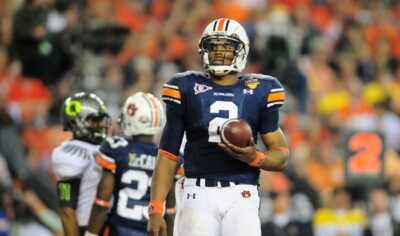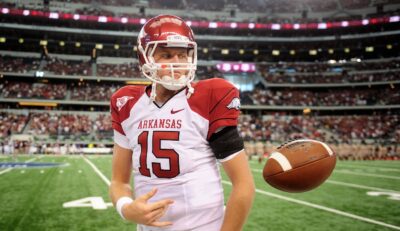Despite NFL and family fame, Eli Manning’s best days were at Ole Miss
By Ethan Levine
Published:
By now, many of you know the highlights of Eli Manning’s backstory.
He’s the son of legendary quarterback Archie Manning and the brother of legendary quarterback Peyton Manning; he followed in his father’s footsteps to Ole Miss, then followed in his brother’s footsteps as a No. 1 overall pick in the NFL Draft.
He’s won two Super Bowls, defeated the 18-0 New England Patriots, and has even taken after Peyton in his comedic endorsements (namely he and Peyton’s ads for DirecTV).
When you live your life in a fishbowl the way Eli does, it’s easy for most of the world to know your story. But for whatever reason, most people outside the state of Mississippi seem to have forgotten what Eli accomplished as a Rebel from 2000-03.
As a three-year starter for a program that hadn’t achieved much success since his father quarterbacked the team, Eli faced immense pressure to return Ole Miss to its former glory during his career. He did just that, and while it is impressive how successful he was as a Rebel, it’s even more impressive when considering the unreasonable expectations he faced.
He took over as the Rebels’ starter in 2001, his sophomore year, and immediately amassed 2,948 yards through the air, 31 touchdowns in 11 games against only nine interceptions and a completion rate of 63.5 percent. Ole Miss closed the year 7-4, which was more or less on par with what the program had achieved the last five seasons, but Manning was already established as one of college football’s best.
He regressed a bit in 2002 as a second-year starter, which is not uncommon as defenses are able to adjust upon having game film to study. His completion rate dropped to 58 percent, his touchdown total dropped to 23 and his interception total rose to 15. Still, he threw for more than 3,400 yards in 12 games and led Ole Miss back to the seven-win mark, this time featuring the school’s first bowl win of the new millennium.
It was a regression compared to 2001, but Manning still posted numbers most college quarterbacks can only dream of accumulating. And when your “down year” is someone else’s “dream season,” it’s obvious that you’re on a different level than everyone else.
This was the case for Eli, who opted to return for his senior season in hopes of doing something his brother had done at Tennessee but that Archie had never done at Ole Miss: win double-digit games.
The youngest Manning flourished in 2003, completing more than 62 percent of his throws, amassing more than 3,600 yards through the air and posting 29 touchdowns against only 10 interceptions. He was undoubtedly the best pro prospect in all of college football, and more importantly he led Ole Miss to 10 wins for the first time since the 1962 season. Last season’s nine-win Rebel squad was the program’s best since the Manning era.
Eli led Ole Miss to a share of the SEC West crown, marking the only time since the SEC split into two divisions that Ole Miss won even a piece of the West It lost its tiebreaker and was unable to play in the SEC championship game as a result, but the Rebels still won the Cotton Bowl to close the season as well as Manning’s career.
With the exception of last season, the Manning teams were truly the only Ole Miss teams to garner any national attention since the early 1980s. He not only transcended college football, but he transcended the history of a program that has existed for more than 100 years in a state that adores football like a son or daughter.
We’ll always remember his last name, his bloodline, his Super Bowls and his commercials. Let’s just hope his college career, arguably more impressive than anything just listed, can be remembered as well.
A former newspaper reporter who has roamed the southeastern United States for years covering football and eating way too many barbecue ribs, if there is such a thing.







